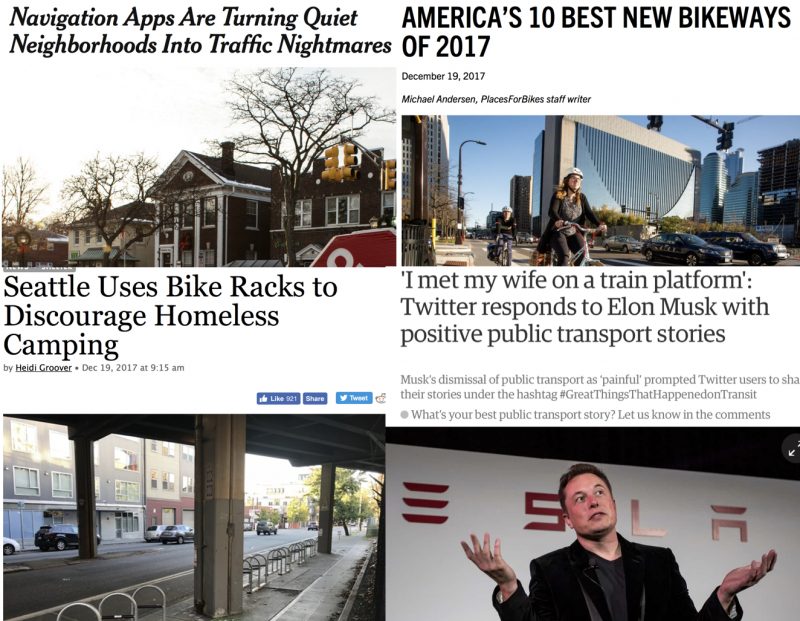
Hi everyone. Hope you’re enjoying a warm and festive interlude between Christmas and New Year’s — and surviving the first ice/snow of the season.
Here are the best stories we came across last week…
No slowin’ car culture: Road & Track Magazine has quite a driver-centric perspective on safety: Slow speeds kill more people, and traffic calming measures makes drivers frustrated and even more dangerous.
Oh Elon: Tesla CEO Elon Musk had quite a week. He bashed public transit, sparked a Twitter rebellion that ended up in The Guardian, and then got into a childish and superficial criticism of a very respected expert on the topic. Here’s aforementioned expert Jarrett Walker summing it all up.
‘Hostile’ bike racks: The Seattle DOT admitted that they are using bike racks as a weapon to prevent people from sleeping on certain streets.
Strength in numbers: A group of non-male pro cyclists has formed a union called The Cyclists Alliance to fight for their business and professional interests.
First-person derailment: Former Portlander Adron Hall (aka “Transit Sleuth”) was on Amtrak Cascades 501 and shared a detailed and harrowing account of what happened.
Advertisement
Lloyd Center for parking: Architecture critic Brian Libby points out that despite its flashy renovation, the preponderance of free auto parking around the Lloyd Center Mall is still its Achilles heel.
Portland is not on this list: People for Bikes has a list of the 10 best new bikeways in America. They look nice. Too bad none of them (not even the honorable mentions!) are in Portland.
No more oil: If the big automakers truly wean themselves from Big Oil, what will that mean for car use in America. Will Big Electric be just as pernicious to transportation reform?
Bike Valet in the Big Apple: New York City DOT wants to see proposals for creation of a bike valet service in Union Square.
Diversion on steroids: With GPS app-inspired cut-through traffic running amok, police in a New Jersey town will close 60 neighborhood streets to all but local residents and nearby employees.
The Trump Effect: A promising pro cyclist from Turkey gave up his spot on the Israel Cycling Academy team citing pressure and discomfort following Trump’s decision to recognize Jerusalem as the capitol of Israel.
Tweet of the Week: The Ottawa Police smacked down a tweet from a mean woman who referred to a man riding a bicycle in the snow as a “knob”.
Bicycles have every right to be on the road all year round. For many, it's their only mode of transportation. Give them room. If you don't have room to give them at least 1 metre of distance, wait until you do before you go around them.
— Ottawa Police (@OttawaPolice) December 22, 2017
Thanks for all the submissions.
— Jonathan Maus: (503) 706-8804, @jonathan_maus on Twitter and jonathan@bikeportland.org
Never miss a story. Sign-up for the daily BP Headlines email.
BikePortland needs your support.



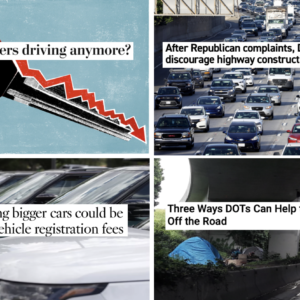
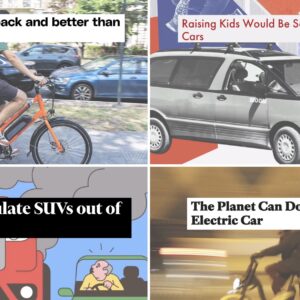
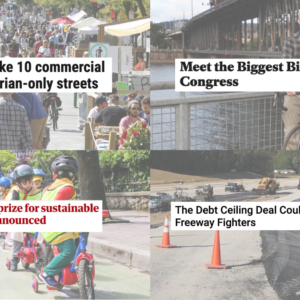
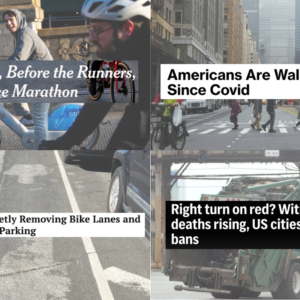
Thanks for reading.
BikePortland has served this community with independent community journalism since 2005. We rely on subscriptions from readers like you to survive. Your financial support is vital in keeping this valuable resource alive and well.
Please subscribe today to strengthen and expand our work.
Sad for piece from Road & Track and Elon.
Big Oil will have more troubles from shortages of new conventional oil discoveries and reliance on uneconomic tight oil than they will from competition by battery powered cars. The real bugaboo for electric cars is a looming shortage of materials to ramp up the production of Lithium Ion Batteries, specifically Cobalt.
https://www.theguardian.com/environment/2017/jul/29/electric-cars-battery-manufacturing-cobalt-mining
Maybe new battery tech that does not rely on rare materials will come about, but until then, we should improve cycling infrastructure and participation rates as much as we can, as it may be our best hope for the future.
electric cars are selling very poorly so they will probably have little impact on mitigating the worst climate change outcomes. even in china where there is a massive incentive program and good charging infrastructure* sales have been disappointing.
https://www.bloomberg.com/gadfly/articles/2017-12-20/electric-cars-race-to-nowhere
*charging infrastructure in the usa is a joke (except for tesla-only infrastructure)
Europe is moving towards banning internal combustion vehicles from 2040 onwards. So France and the UK at least will be 100% electric going forward from 2040.
The UK is not banning internal combustion vehicles at all:
http://www.roadandtrack.com/new-cars/car-technology/a10362988/uk-gas-diesel-cars-2040/
As for France, I think that’s essentially a PR stunt and has about as much likelihood of being *funded* as Portland’s 2030 Bike Plan.
A good local illustration of how little interest there is in EVs is the fact that many quick charging stations have gone offline due to lack of money for repairs. I’m considering selling mine because charging has become a real pain.
I really with that Road and Track article had a comments section. There was zero concept of driver’s expressing patience or awareness of their surroundings – the whole gist was “how dare anything slow me down!”
I would recommend writing a letter to the editor. That’s what I plan on doing. This link points to their “contact us” page: http://www.roadandtrack.com/about/a2922/contact-us/. Scroll down to find all the ways to let them know how you feel. I suggest we get loads of us annoying bicyclists to hit them with letters, tweets and other means of commentary on how myopic and neanderthal-ish their way of thinking is.
The Road and Track magazine also refers to a traffic calming study from Bath UK that purportedly found that casualties went up after introducing 20 mph zones; it’s been reported in quite a number of media publications recently… except it’s not true. The study analysis was flawed to say the least; this article provides some background to it all: http://www.20splenty.org/freddie_star
Thanks for the link, GlenK. I figured as much. If you read the R&T piece with suspicion you notice the little logical jumps he keeps making, and the loose relationship the author has with anything resembling (investigative or journalistic) rigor.
I’m sure they’ll reexamine their views if a bunch of car hating cyclists complain — much as people here undoubtedly change their views if cyclist hating motor heads complain about views expressed here… 😉
“…zero concept of driver’s expressing patience or awareness…”
Yes, this article appears to be written from the drivers-as-wild-animals perspective. This is my characterization of the notion that drivers just can’t help but be inattentive, angry, and impatient. And they cannot be counted on to have one scintilla of empathy or moral capacity. Therefore, one best not do anything to draw the ire of the motorist. If one encounters a motor vehicle piloted by a “driver”, one should immediately freeze, then slowly back away. When forced to travel in known motor vehicle habitat, one would be wise to wave a flaming torch with bells attached; this is believed to ward off wild drivers if you take one by surprise…
*wish*
I certainly hope the Portland PD gets the hint from New Jersey and drops the hammer on the cut-through criminals. I predict that if they ignore this tech-driven mayhem we will soon see neighborhood patrols with citizen manned check points pop up to screen out the wayzers.
Grainger sells a variety of speed bumps, check their catalog. Wonder if they sell radar guns too–should look.
Well, you would first have to criminalize driving. Criminalize the mere act of existing on a public road.
Portland would never take on such active measures for fear of the backlash that would happen when the first self-identified victim gets a ticket.
And good for them. We are constantly reminding people that they do not own the parking space in front of their homes. This is the exact same thing. From a social justice standpoint… just imagine a law that says you cannot enter Westmoreland via car unless you live there; or better yet, all of the west hills where our elected leaders tend to come from. I suppose it doesn’t matter though. It’s not like PPB is going to actively enforce laws anyway, but that breeds selective enforcement which is considerably more problematic.
Re; Road and Track article: I’m not convinced the conclusions the author of that story accepts regarding how people drive, or walk relative to posted speed limits, generally reflects the conduct of most people using the road. He doesn’t outright say so, but seems to imply he thinks most people drive as fast as they feel like like driving, regardless what the posted speed limit is.
He seems to indirectly acknowledge that posted speed limits considerably lower than the speed a some people believe they can comfortably drive their motor vehicle on a given road, will have those people be the exception to other people driving within or close to the posted speed limit. Outcome being, that people on foot or riding a bike, get accustomed to using the road with people driving within or close to posted speed limits lowered to be more compatible with walking and biking; author thinks that people biking and walking become less wary of over-speeding drivers, or as he paraphrases conclusion of some study he cites: “…One theory, as proposed by the firm that studied the fatalities: Cyclists and pedestrians become increasingly careless as the traffic speeds around them decrease. …”.
In some locations and specific traffic situations, what he says about people driving and people walking, relative to the posted speed limit…is true. Big cities, London, and studies about traffic there, is one of the cities he mentions, and the commute in and out of NYC.
In many other locations and specific traffic situations, I don’t think what he says and accepts, is true. His story starts out great in its first two paragraphs, talking about how awareness of vulnerable road users enters in to how some people drive; slower and conscientious about there possibly being kids along the road they’re driving. I would say, how ‘most’ people drive. Then he makes a big jump to accept that because some big cities have had some problems in reducing the speeds in excess of posted some people driving at…reducing posted speed limits to speeds compatible with biking and walking, is maybe not such a good idea.
Elon is a wily dude, physics drop-out, software promoter, with a formidable will to dominate.
He can do little of the sophisticated design required in his cars, and none of the transcendently difficult engineering required by his rockets. He hired superb engineers of great experience for SpaceX, competent automotive people for Tesla.
Powerful rockets have been around for 60 years, developed at vast expense by governmental agencies. Electric cars for urban transportation date to the 19th century.
Musk’s reputation rests entirely upon old well-proven developments by others. He hires experts to build upon those and then milks them for all the ego possible.
Do not expect Elon Musk to actually understand the technology his companies employ.
Elon’s real genius is in attracting and burning through government subsidies.
on speed bumps: “(The American alternative to that tactic, which is to put a six-inch lift kit on your Ram diesel and just motor over those bad boys, is also probably not great for the ice caps.)”
It’s okay if it’s biodiesel;)
Let’s recap Musk’s career because I don’t think people really understand just the level of staggering luck this man has experienced:
– co-founded Zip2 with his brother which only several years later is acquired by Compaq prior to the dot com crash for $300 million of which Elon receives something like a 10% share.
– co-founded X.com with money from Zip2 sale and this almost immediately merges with PayPal. Shortly after the PayPal merger, Elon is removed from being CEO. Several years after X.com started up, PayPal sells to eBay for $1.5 billion of which Elon receives something like a 10% share.
– applied money from PayPal sale to found SpaceX which only several years later got on the NASA gravy train of privatization enabled by the Bush administration. Your tax dollars at work.
– worked on Tesla’s financing after the company developed their initial roadster
– provided funding for SolarCity founded by his cousins which later had to be absorbed by Tesla to prevent SolarCity from failing during the solar price crash between 2014 – 16.
From this simplified overview, it’s apparent that the man’s talents are in business marketing. He’s very good at stoking rich people’s greedy fantasies and then translating them into funding for his ventures. Good for him, but he’s also confused for some sort of oracle on all things tech and as a technical person. He isn’t that and appears to suffer from, what I call, the Michio Kaku Syndrome, the mistaken belief that a high degree of proficiency in one field endows one the wisdom to speak intelligently about every other field. It’s quite an embarrassing but entirely self inflicted malady.
There are usually a couple ways of looking at things.
From an engineering standpoint what SpaceX has done is incredible. Before SpaceX the United States had completely lost the private (non-government) space launch business to the European Space agency and the Russians. ULA only launched US government (NASA, Air Force, NSA) payloads because it was not cost competitive with the rest of the world. Today SpaceX now dominates the private (commercial) launch business and by next year is forecast to have over 50% market share. Why? Because they innovated by making the first commercial re-usable 1st stage and capsule. They also efficiently manufactured the the rockets. Reusing launch systems was not new but all the previous attempts were a bust. Remember the Space Shuttle. The cost was at least 10X the cost of a SpaceX launch which is why it was only used for cost is no object government launches.
I would love to see more bicycles used for transportation but for a person that breathes air the next best thing to bicycles would be electric scooters or electric cars powered by renewable energy (like the solar that Solar City produces). Tesla is the only car company that is exclusively electric powered and so far they have been successful. Only time will tell if it survives but it has outlasted many other transportation startups.
It could be luck or he could have vision and the engineering/technical background to guide his companies to solve difficult challenges.
Some of his views about mass transit are correct and probably explain why bus ridership in Portland in 2017 is below 2000 levels. For me my first choice is bike which is almost always faster than Trimet. After bike private automobile and Lyft/Uber are more expensive but much more pleasant and faster. Places like Paris, London and NYC have great subway systems that get you around very quickly because unlike light rail and bus they don’t get stuck in traffic. Portland would do well to add transit that does not have to compete with road traffic so that it would appeal to people that can afford to make choices. Unless citizens and the government is willing to recognize that our transportation system is generally terrible there will be no will to try to change it.
I used to use light rail a lot when the route to Beaverton opened. Of course the only way that I could make the commute work was to ride my bike to the last stop before the tunnel then ride the train to the Beaverton transit center, leave the train and ride the rest of the way to work. If I had taken buses and ridden Max through the super slow downtown it would have taken 2+ hours to get to work. Bike+Max was about twice as fast. Sadly driving was even quicker.
Personally, I wouldn’t call a business successful until it turns a profit. SpaceX, and Tesla still have yet to turn a profit.
Amazon lost money for the first 8 years and still periodically loses money and is generally regarded as a successful business. Automobiles, solar, and rockets take a lot of capital and expense to start up. Based on stock price investors believe that Tesla will be a successful business and it has had a positive EBITDA for 3 of the last 5 years. Of course the stock market makes plenty of bad bets.
Perhaps this has already appeared on Bike Portland, but, meanwhile, in NYC:
https://www.theguardian.com/us-news/2017/dec/25/new-york-citys-electric-bike-delivery-workers-face-crackdown
People are getting their ebikes confiscated.
Elon Musk is greatest carnival barker of our times. All he does is build expensive cars for the elites.
I looked at the PfB ten best bikeways and came away unimpressed. Most of them are just “look at me” sort of things that might be improvements, but are hardly fantastic. They consistently miss important spacing and other details. For example, take a look at the photo of Bancroft in Berkeley. One lane of the (almost always awful) two-way cycletrack is functionally about 18 inches wide. The buffer is too wide, which caused the bikeway to be too narrow, an all too common problem when the people designing them just don’t have the miles in the saddle to develop the necessary expertise. Or look at the egress from the bridge in NYC. The concrete cut-outs to get onto the street are far too narrow for that angle, and the expected paths are meters off, as shown by the trajectory of the riders in the video.
We really have a long ways to go to get the planning, engineering and construction of bikeways up to a level that would significantly alter our horrid participation numbers. Unfortunately, we have PfB and LAB constantly giving out awards for half-assed attempts that might be slight improvements but continue to fail. Worse yet, these constant awards to tiny, inadequate incorrectly constructed projects just encourages bad behavior from local traffic planners as they try to get an award instead of fixing the grid so that the majority of the roads are able to be ridden on with reasonable safety and efficiency.
Israel as the capitol of Jerusalum?
?
That was a mistake on my part. I’ve fixed the post.
Jerusalem as the capital of Israel?
closer, but what does this have to do with anything in this thread?
Inquiring minds are curious.
Jonathan — why did this story catch your eye? It’s nominally about bicycle racing and more about politics. Care to elaborate?
Glad to see the Twin Cities landed TWO projects on this list. Downtown St. Paul is a horrible place to bike right now (there are ZERO bike lanes of even the lowest quality, so it’s either take the lane or dodge pedestrians on the sidewalk), and this is a great first of five major bikeways planned. Staid St. Paul has seen a lot more pushback than Minneapolis against its bikeway plans: Cleveland Avenue last year, with businesses banding together to oppose the project so they could preserve a handful of welfare parking spaces, gave me major flashbacks to Portland’s NE 28th – with the gigantic exception that Cleveland Avenue got done, and 28th didn’t. The NIMBYs opposed to progress are starting to lose more often in St. Paul, so there is a lot of hope for the future.
Minneapolis, on the other hand, has plenty of bike lanes in its downtown, but (with the exception of S 3rd Avenue’s and N 1st Avenue’s protected lanes, which are awesome) of disappointing quality: often just 5-6′ wide, more often than not on the left side of the one-way streets (or in the MIDDLE of a two-way street, in the case of 2nd Street), and with cars legally allowed to blast by at 30 mph. This is the first east-west protected lane, and it’s great. As the article points out it is short, the door-zone bike lane to the east of this segment isn’t great, but to the west it connects to a very nice, mostly-buffered and very long lane on North Washington.
The one thing I haven’t figured out about the Washington Avenue lane is the signal timing. It has dedicated bike signals, but unlike in other locations where the bike signal gets a leading interval (i.e., it goes green a couple seconds before the adjacent car traffic, to give the bikes a head start), it is a lagging interval. Cars get the green, then a couple seconds later bikes get the green. Makes absolutely no sense to me, but there must be a reason.